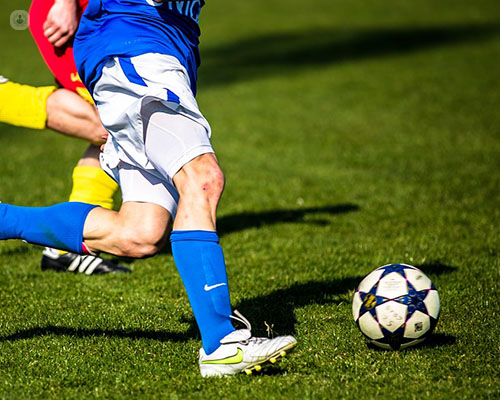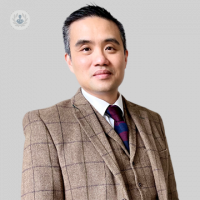ACL injury: the importance of treating it quickly
Written by:ACL (anterior cruciate ligament) injuries are very commonly sustained, especially by patients who are actively involved in sporting activity. Depending on the severity and the promptness of the diagnosis, ACL reconstructive surgery may be required in order to help patients regain the knee mobility and function they had before the ACL injury.
In our latest article, esteemed London-based consultant orthopaedic surgeon, Professor Paul Lee, tells us when and why someone would typically require ACL surgery, and outlines the various potential complications related to the surgical procedure.

Why would someone require ACL surgery?
If patients have instability (if they feel their knee become wobbly), they should definitely see a doctor, and they may require ACL (anterior cruciate ligament) surgery. For a young person who is very sporty, they normally rather an internal fixation to have an internal splint put in to treat their ACL injury.
Are there different types of ACL surgery?
There are many different types of ACL surgery, and we use different graphs to decide with the patient which one would best suit them. ACL surgery can either be performed as a keyhole (minimally invasive) surgery or as an open surgery.
One technique that we commonly use involves using a single tendon instead of using two tendons. Here, the patient can recover a lot quicker because you have one less cut tendon, and we can also stretch that tendon for the patient to turn it into a ligament. A fixation method is also important, because if we fix it in a certain way, it will become very, very sturdy, and the recovery time can, in this case, generally be cut by half.
What is important to consider when it comes to the preparation for ACL surgery and the procedure itself?
Before the surgery, we must ensure that the patient has adequate rehabilitation and adequate muscle function. One of the most common things following ACL surgery is that the quadricep muscle usually goes to sleep and doesn’t work properly. It takes approximately two to three months before this specific muscle gets back to normal function.
There is good evidence to suggest that, if we have trained that muscle before ACL surgery, the muscle can regain normal function a lot quicker after ACL surgery than it normally would do. This really cuts patients’ overall rehabilitation period.
With regards to the procedure itself then, it goes without saying that it is vital to choose the right surgeon to perform ACL surgery, preferably an orthopaedic surgeon with a proven track record in ACL surgery.
Are there risks involved in ACL surgery?
The main standard risks involved in ACL surgery include infection, problems related to fractures, and the knee becoming stiff after ACL surgery. Sometimes, patients who have had ACL surgery will notice that they are unable to fully extend their knee.
Are there alternative ways to treat ACL tears?
Yes, depending on the symptoms that the patients present with. Early diagnosis is extremely important. A special dynamic brace (that wasn’t available a few years ago) is now available for patients with ACL injuries. This brace can greatly reduce ACL tears and can allow the body to heal naturally.
We can also talk to the patient about repairing the ACL injury instead of reconstructing it. Finally, injections are also another possible alternative to ACL surgery.
What happens if an ACL injury isn’t treated quickly?
If it is not treated quickly, a full ACL rupture can occur. This can speed up the development of osteoarthritis of the knee.
Professor Paul Lee is a highly trained, trusted, and experienced consultant orthopaedic surgeon who is nothing short of an expert when it comes to ACL injuries. Consult with him directly today by visiting his Top Doctors profile.


